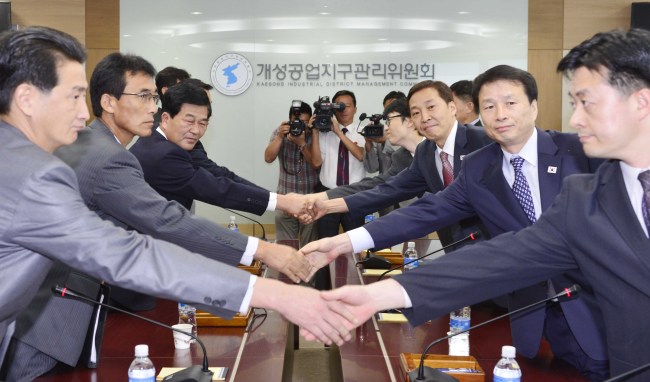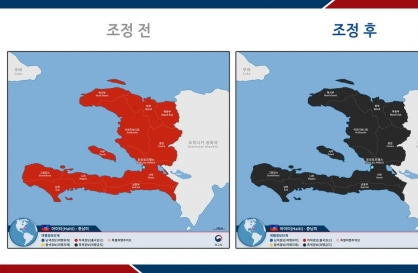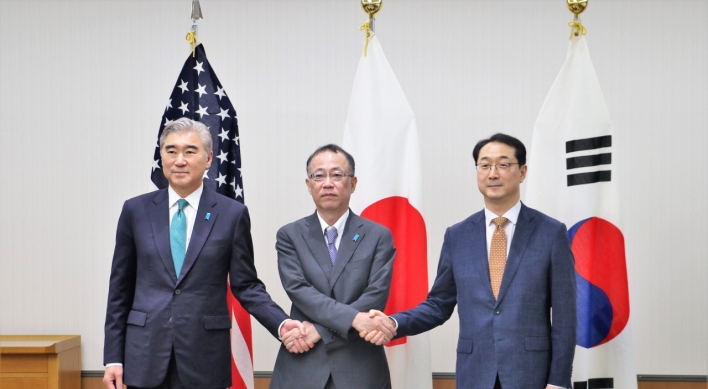Seoul to give $6.3m in aid to N.K.
Two sides hold talks on safeguards, timetable to reopen factory park
By Shin Hyon-heePublished : Sept. 2, 2013 - 21:36
GAESEONG/SEOUL ― South Korea has decided to resume support for World Health Organization programs to help malnourished North Korean children in a fresh sign of warming cross-border relations.
The Unification Ministry said Monday the government would finance half the $12.6 million project, which was launched in 2006 to help improve hospitals, train personnel and boost supplies of essential medicine in the North.
Seoul contributed about $10 million annually to the program between 2006 and 2008 and more than $13 million in 2009. It discontinued support in 2009 amid increased inter-Korean tension.
The ministry said it would also approve 12 local civic groups’ shipments of 2.35 billion won ($2.13 million) worth of nutritional assistance, medicine and school supplies to the impoverished country.
“We will issue approval once each group completes consultations with North Korea, plans to secure transparent distribution, and preparations of goods,” spokesperson Kim Hyung-suk told reporters.
The assistance for the WHO will be carried out after consultations with relevant agencies and a vote by the South and North Exchange and Cooperation Promotion Council, a state-run policy advisory panel, he added.
The decision marks the latest in a string of humanitarian assistance packages for the northern neighbor, driven in part by torrential downpours that pummeled the peninsula for nearly 50 days until mid-August.
In March, the Park Geun-hye administration approved the Eugene Bell Foundation’s shipment of tuberculosis drugs to eight hospitals in the North and vowed to give the U.N. Children’s Fund $6.04 million for programs to help North Korean infants and pregnant women. It also allowed five civic groups to provide 1.47 billion won worth of aid in late July.
The Unification Ministry said Monday the government would finance half the $12.6 million project, which was launched in 2006 to help improve hospitals, train personnel and boost supplies of essential medicine in the North.
Seoul contributed about $10 million annually to the program between 2006 and 2008 and more than $13 million in 2009. It discontinued support in 2009 amid increased inter-Korean tension.
The ministry said it would also approve 12 local civic groups’ shipments of 2.35 billion won ($2.13 million) worth of nutritional assistance, medicine and school supplies to the impoverished country.
“We will issue approval once each group completes consultations with North Korea, plans to secure transparent distribution, and preparations of goods,” spokesperson Kim Hyung-suk told reporters.
The assistance for the WHO will be carried out after consultations with relevant agencies and a vote by the South and North Exchange and Cooperation Promotion Council, a state-run policy advisory panel, he added.
The decision marks the latest in a string of humanitarian assistance packages for the northern neighbor, driven in part by torrential downpours that pummeled the peninsula for nearly 50 days until mid-August.
In March, the Park Geun-hye administration approved the Eugene Bell Foundation’s shipment of tuberculosis drugs to eight hospitals in the North and vowed to give the U.N. Children’s Fund $6.04 million for programs to help North Korean infants and pregnant women. It also allowed five civic groups to provide 1.47 billion won worth of aid in late July.

Notably, the newly-authorized private aid items include 63 tons of flour needed to make “nutritional bread” for kids.
Along with rice, cement and heavy equipment, flour has long been one of the sensitive items due to concerns that the regime may divert it for military and other uses.
“We concluded that approving the transport of flour as an ingredient of nutritional bread would not be a problem,” Kim noted.
“But for the purpose of direct consumption, it will take time given the distribution transparency issue and the possibilities for diversion.”
Pyongyang reported that at least 46 were killed or missing and nearly 50,000 became homeless across the country due to the unusually long rainy season, according to the International Federation of Red Cross and Red Crescent Societies, the world’s largest humanitarian organization based in Geneva.
The U.N. said last month it was in “urgent need” of $98 million to fund emergency aid for the communist country, where some 2.4 million people need regular food handouts.
Despite rampant food shortages and health care deprivation there, relief groups at home and abroad have been struggling to raise funds in recent years in the face of tension and sanctions over the North’s nuclear program.
The announcement came as an inter-Korean panel held its first meeting in Gaeseong to discuss infrastructure upgrade, compensation for businesses, asset protection and other thorny issues crucial for reopening the industrial zone.
Four officials from each side will together oversee four subcommittees on South Koreans’ access and stay; investment protection and management and operation; passage, communications and customs; and international competitiveness, respectively.
With the time frame for the restart of factories topping the agenda, another key issue is the formation and heads of the envisioned secretariat of the 12-member committee, which the two sides were working to seal an accord on.
The negotiations were led by the panel’s co-chairs ― the South’s Kim Ki-woong, director-general of inter-Korean cooperation district support at the Unification Ministry, and the North’s Park Chol-su, vice director of the General Bureau of the Special Zone Development Guidance.
More than 600 corporate managers and employees also traveled to the border city to continue repair and maintenance of their facilities, many of them expressing hopes for a speedy normalization.
“We’re ready to get back to work any time if allowed. We’re also given a raise in the number of North Korean workers we may hire from 50 to 100,” a businessman told reporters, asking anonymity due to the sensitivity of the matter.
Another businessman cited a senior North Korean official as saying that 95 percent of the 53,000 North Korean workers can start work immediately.
“But some firms need further preparations, while others can begin operations right away. It seems to be about half and half,” he added.
By Shin Hyon-hee, Joint Press Corps
(heeshin@heraldcorp.com)











![[New faces of Assembly] Architect behind ‘audacious initiative’ believes in denuclearized North Korea](http://res.heraldm.com/phpwas/restmb_idxmake.php?idx=644&simg=/content/image/2024/05/01/20240501050627_0.jpg&u=20240501225745)






